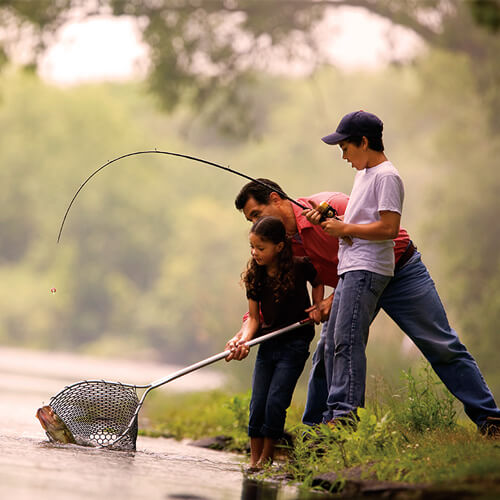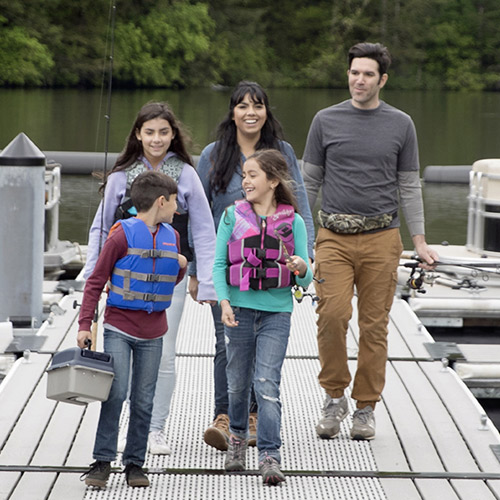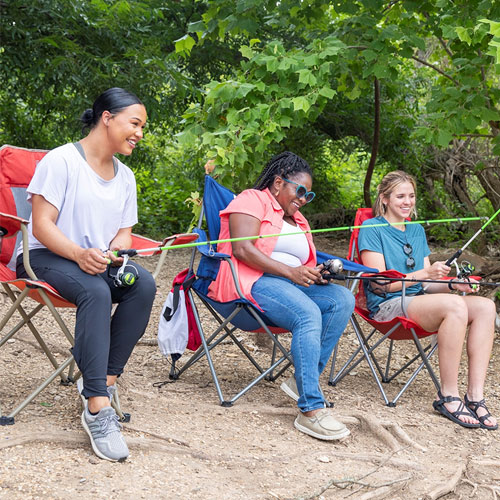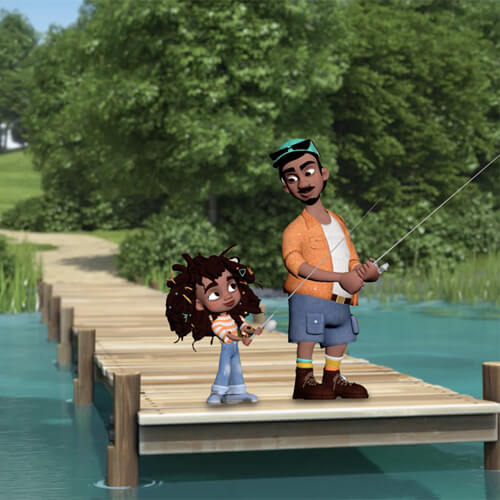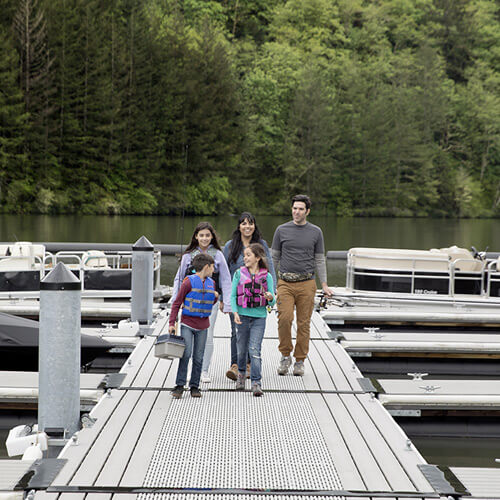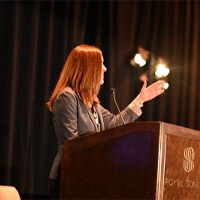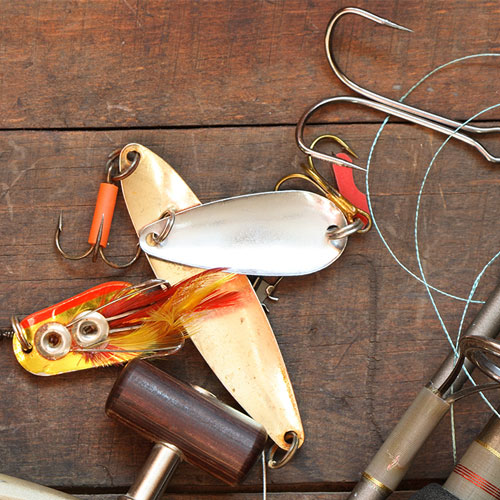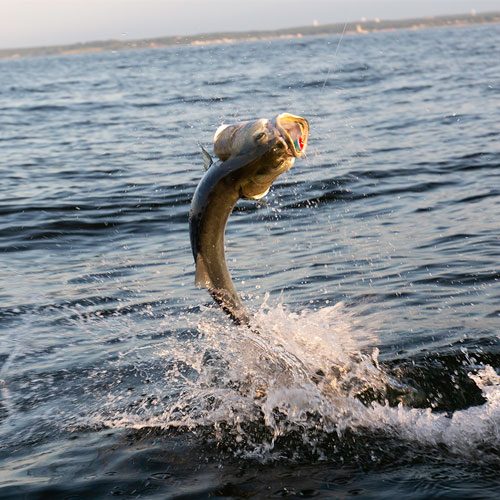Success Stories
RBFF works with its stakeholders to recruit, retain and reactivate anglers and boaters, and produces program case studies to share the learnings.
State R3 Program Grants
RBFF’s State R3 Program Grants help fund state programs that are sustainable and replicable angler and boater recruitment, retention and reactivation (R3) initiatives that focus on increasing fishing license sales and boat registrations.
2019
Arkansas Game & Fish Commission (AGFC) used a multi-channel marketing campaign to support their target audiences through the entire consumer life-cycle from increased consideration of fishing to a license purchase and ultimately to a fishing experience.
Learn more from the case study
Idaho Fish and Game (IDFG) created an integrated marketing campaign to recruit and retain resident millennial anglers. The goal of the campaign was to increase the number of adult fishing licenses sold to 18-37 year-olds, and to increase the number of retained angler year-over-year.
Learn more from the case study
Indiana Division of Fish & Wildlife (IN DFW) worked to retain anglers and decrease churn rate by distributing emails and postcards to nonresidents reminding them to renew their fishing licenses. A total of 1,384 anglers renewed their fishing licenses resulting in a cumulative reactivation rate of 7.97% from this effort.
Learn more from the case study
Massachusetts Division of Fisheries & Wildlife (MassWildlife) created a partnership with the MA Department of Conservation and Recreation (DCR) and promoted a list of Top 10 Campsites for Fishing. Search engine marketing, display ads and social media ads were used to engage campers and increase awareness and interest in fishing.
Learn more from the case study
Nevada Department of Wildlife (NDOW) created and implemented a multi-tiered campaign to reach several target audiences including a focused campaign that targeted Hispanic anglers in Southern Nevada. Fishing and boating were promoted in a bilingual digital campaign that ran statewide in both English and Spanish.
Learn more from the case study
Tennessee Wildlife Resources Agency (TWRA) targeted customers with digital advertising in specific locations at events to encourage them to buy a license and go fishing. Using geofencing, they were able to reach people without a TN fishing license account, or those folks that had a lapsed account of 18 months or more.
Learn more from the case study
Vermont Fish & Wildlife launched a digital marketing campaign to increase non-resident fishing license sales and reduce non-resident churn rate. To support this effort, digital ads were placed on Facebook, Google Search, YouTube, and in the May and June issues of On the Water (a digital fishing magazine.) Lapsed angler reminders and bi-weekly fishing reports were also sent to 2019 license holders.
Learn more from the case study
Virginia Department of Wildlife Resources (VA DWR) launched a Refer-A-Friend To Fish campaign in April with the objective of motivating current licensed anglers in Virginia to recruit new people to fish. They also focused on improving the marketing strategy that had been implemented earlier in 2018. This was done with social media advertising along with an earlier campaign launch to coincide with the spring fishing season.
Learn more from the case study
2018
Iowa Department of Natural Resources (IA DNR) created a “Fish Local” campaign to increase fishing participation in the state’s Des Moines metro area. The goal of the program was to promote fishing locations in areas that were easily accessible for families, in addition to encouraging people to spend time outdoors with a fun and relaxing pastime.
Learn more from the case study
Massachusetts Division of Fisheries & Wildlife (MassWildlife) tested the implementation of new tracking techniques, primarily through a digital marketing campaign on Facebook, Instagram, and Google Ads. Postcards and emails were sent in an effort to retain anglers.
Learn more from the case study
Learn more from the grant final report
New Jersey Division of Fish and Wildlife (NJDFW) explored an email communications campaign to reactivate freshwater anglers. These simple emails prompted 1,730 anglers to be reactivated; including 167 that had been lapsed for over 5 years and generated over $54,000 in revenue!
Learn more from the case study
Oregon Department of Fish and Wildlife (ODFW) provided training to fishery biologists and field staff to show how important recruitment, retention and reactivation (R3) efforts are to the agency. This R3 training increased field staff understanding of the basic tenets of R3, how their duties impact R3 and ways to apply R3 considerations in resource management decisions.
Learn more from the case study
Oregon Department of Fish and Wildlife looked to find people passionate about fishing that desired to share their passion with others. These fishing ambassadors helped bridge the gap between ODFW’s current social media followers and the ambassadors’ local communities with their corresponding influence in their social media followers and miscellaneous groups.
Learn more from the case study
Virginia Department of Wildlife Resources (DWR) launched a Teach a Friend to Fish campaign to motivate current anglers to introduce someone new to fishing and participate with them. A referral system was created for current customers to send a unique referral code to new customers to buy their first fishing license.
Learn more from the case study
Wisconsin Department of Natural Resources (WDNR) emailed first-time fishing license buyers and lapsed anglers with targeted messaging that resonated with boomers and millennials. License purchasing analysis showed that the email marketing campaign provided a lift of 3.5-4.7% in fishing license sales when compared to the control group!
Learn more from the case study
2017
Georgia Wildlife Resources Division (GA WRD) brought in over $1.2 million from a digital marketing campaign and search engine marketing. To achieve this success, they used current angler data to target lookalike audiences and even placed ads on Amazon to reach outdoorsy customers.
Learn more from the case study
Massachusetts Division of Fisheries & Wildlife (MassWildlife) utilized RBFF’s Retention and Reactivation Toolkits to send direct mail and email to retain new anglers and reactivate lapsed anglers. They sent out various combinations of direct mail and email to learn which communications yielded the most license renewals.
Maryland Department of Natural Resources (MD DNR) utilized learnings from the RBFF Vamos A Pescar™ campaign to reach out to the Hispanic community. For their “Es Mi Parque” program, they hosted “Fun Days” at state parks with a high population of Hispanic visitors that included presentations and games to teach families about conservation.
Michigan Department of Natural Resources (MI DNR) engaged lapsed female anglers in targeted counties to increase their reactivation rate. Using emails and postcards, MI DNR wished to evaluate what communication method or combination of methods had the highest effect on reactivating lapsed women anglers.
Michigan Department of Natural Resources (MI DNR) sent emails and postcards to retain first-time license buyers since new anglers are more likely to lapse than repeat anglers. The goal of this campaign was to retain 5% of Michigan’s first-time resident license buyers who purchased a fishing license in 2016.
Minnesota Department of Natural Resource (MN-DNR) created a campaign to retain anglers by promoting the purchase of a lifetime license. Like many other states, Minnesota’s angling population is growing older, and younger anglers are not being recruited into the sport at a high enough rate to replace them. Thus, this promotional effort was aimed at both younger adult anglers and older anglers who might purchase lifetime licenses.
Washington Department of Fish and Wildlife (WDFW) hosted its second Annual Statewide Trout Fishing Derby from April 22 – October 31, 2017. Parenting and regional magazines, e-blasts, lake signs, ads on Pandora streaming music station, and school system distribution were all utilized to reach this new audience.
2016
Iowa Department of Natural Resources partnered with the Iowa Tourism Office on the “Gone Fishing” campaign to promote Iowa’s fishing opportunities through digital media platforms to increase license purchases.
Learn more from the case study.
Nebraska Game and Parks Commission developed a method to sell on-site permits and collect data on fishing program participants in order to send follow-up communications and track participant recruitment and retention.
2015
Georgia Wildlife Resources Division created an easy and convenient telephone Interactive Voice Response (IVR) system to increase boat registration renewals and shorten the lapse period between renewals.
Learn more from the case study.
Nebraska Game & Parks Commission developed an auto-trigger email system to send customized messages to anglers purchasing fishing licenses and to increase angler engagement.
Vermont Fish and Wildlife launched the “Reel Fun Vermont” campaign to increase visibility of fishing opportunities in Vermont State Parks to boost fishing participation and subsequent fishing license sales.
Please contact Stephanie Hussey, State R3 Program Director, with any questions.
Recent Blogs
